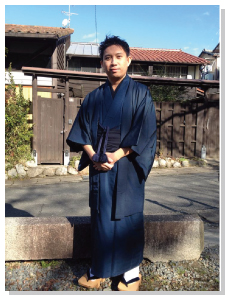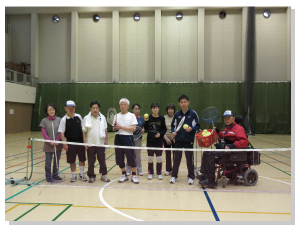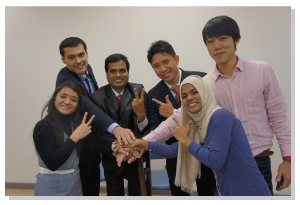- HOME
- Alumni News
- Viliya CHANCHALEUN (16th trainee)
- Chigong's Final Report
Chigong's Final Report
New Hope for Persons with Visual Impairment in Laos
1. Things I did in Japan during the 10-month Training
My training in Japan consisted of 3 main themes. First, I took a Japanese course which was very fundamental and important for this training because most of the time I lived in Japan, I had to use Japanese. I am very pleased to have learnt it because the Japanese language is one of my favorite languages. I did have difficulties during the course because I was not really familiar with using Braille, but it was a very nice experience. Next, I stayed at the homes of Japanese families. It was one of the many experiences I had in Japan. While I was staying at their homes, I managed to learn about Japanese culture and lifestyle which I could compare with those of my home country, to see similarities and differences. Finally, I went through individual training which was a very important part of this program. During the individual training, I learned many things that were very new for me. I will take these experiences back home and build on them to improve the life of the visually impaired in Laos. Also, I can also give them hope through my experiences in Japan.

2. Training and Learning in Japan
Before coming to Japan, I was very curious about learning new things concerning persons with visual impairment, particularly Japan’s education and employment system. After arriving in Japan, I got to know and learn many things that motivated me to do more to improve the lives of the visually impaired in Laos. I also learned about barrier-free social infrastructure and devices for disabled people. For instance, in the public transport sector, they incorporate sound in the train so that persons with visual impairment can understand where they are, including the station. This is why I managed to travel by myself during the individual training period. I also observed that blind people in Japan, especially university students and employed people use very high-tech devices at work such as: screen readers, magnifiers and Braille displays. However, in Laos, there is not even a Lao screen reader, and it is very tough for us. Besides education and employment, I also learned about sports and producing DAISY for persons with disabilities. See below, for what I learned during my training.
2-1. Education System
In Japan, there are schools for the blind and inclusive study is also available, which is quite similar to Laos. However, the difference is Braille books and DAISY books, provided in these Japanese schools. This means there are more opportunities in Japan for persons with visual impairment, and they can use Braille text and DAISY books in class because Japan has a large number of libraries which accommodate Braille and DAISY books for the blind. Special schools in Laos do not have Braille books. Furthermore, we do not have DAISY producers, which is another thing inhibiting information access.
2-2. Employment
I visited workplaces that employed persons with visual impairment. I saw that persons with visual impairment could collaborate with non-disabled people because they had the help of special devices at work such as: PC talker and Braille displays. This is why the blind in Japan have more employment opportunities.
2-3. DAISY Production
DAISY books are audio books for persons with visual impairment. For the first time, I learned how to produce DAISY books at ATDO during my individual training. I think DAISY is very important because persons with visual impairment can use these audio books to access information, listening to the material. Besides, DAISY books are quite easy to take to other places. Now in Japan, the number of DAISY users is on the increase. On the contrary, special schools in Laos do not have a main center to produce DAISY books, even though they can be important learning materials for daily use by the blind.
2-4. Sports for Persons with Disabilities
During the training at ADDP, I watched sports for disabled people especially goalball for the blind. I participated in the training session of the Japanese national team where I learned new rules and techniques that could be applied to and developed by the Lao team. I also watched wheelchair basketball at Sun Industry in Oita Prefecture where work and sport were done in the same location, an innovative approach for other areas in Japan.

My Personal Development
Living in Japan, I had a lot to learn and I also had many experiences, the most notable of which was learning how to live alone. When I lived in Laos, I usually asked for others’ help, especially from the members of my family. But living in Japan, I had to take care of myself and it made me more confident and ready to tackle problems by myself. This was a good experience. I also learned how to get along with fellow trainees and support each other, and I also got to know how to live in a different society.
Future Plans after Returning to Laos
First, I will get ready for the training of the blind sport team because we are going to participate in the Singapore ASEAN para-game this coming December. Next, I will renew the library at our special school and create a DAISY production room. Now, we do not have any specific section for DAISY books, so it will be a great place to start promoting DAISY books in Laos. It will also give opportunities and hope to students with visual impairment. On top of that, based on my knowledge and experiences from Japan, I would like to take matters to the governmental level to change the situation for blind students in Laos. The students cannot attend university because university principals lack the experience of teaching persons with visual impairment. I would like to bring to Laos the situations I have seen in Japan.
My Gratitude
I would like to express my warm regards to Duskin, JSRPD, my teachers, my host family, volunteers and everyone else who helped me during my training and stay in Japan. Thank you very much indeed.





